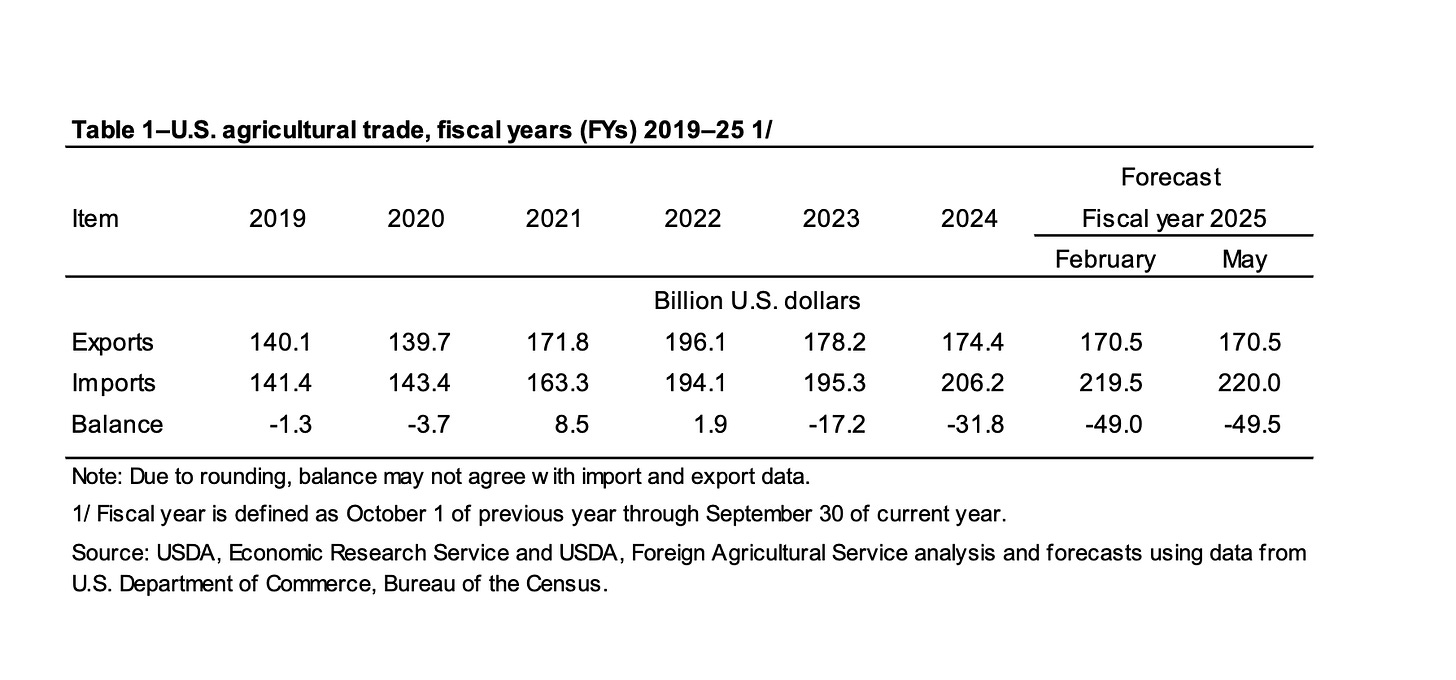The Trump administration is trying to block politically inconvenient government data
Hands off the public's data!
This post is made possible by paying subscribers to Strength In Numbers. It would normally be paywalled, but this is a story everyone needs to read.
Here’s the story:
Politico: “Trump officials delayed farm trade report over deficit forecast”
“Administration officials blocked publication of written analysis that normally accompanies the report because they disliked what it said about the deficit.”
Politico reports that:
Trump administration officials delayed and redacted a government forecast because it predicts an increase in the nation’s trade deficit in farm goods later this year, according to two people familiar with the matter.
The numbers run counter to President Donald Trump’s messaging that his economic policies, including tariffs, will reduce U.S. trade imbalances. The politically inconvenient data prompted administration officials to block publication of the written analysis normally attached to the report because they disliked what it said about the deficit.
The published report, released Monday but dated May 29, includes numbers that are unchanged from how they would’ve read in the unredacted report, said the people, who were granted anonymity to discuss internal decision-making.
The report shows that the trade deficit is rising, not shrinking, due to Trump’s tariffs:
[The previous report] projected a deficit of $49 billion for the current fiscal year, an increase from the November 2024 report. The new analysis revises the projection to a record $49.5 billion, beating the previous record of $31.8 billion in fiscal 2024.
And here’s a screenshot of the math in the report. Note the surge in imports for February and May 2025. That’s what the Administration was trying to hide.
This is not necessarily surprising given how severely leaders of the Republican Party have now polarized the party against factual reality. But it is notable as an escalation of that crisis to a new domain: official government data.
Delaying or manipulating government data is bad for a few obvious reasons.
I have two other points:
1. Government data belongs to the public! You should be mad about this!
This first point is not said often enough.
When the government collects data, it is doing so with your tax dollars — about the things that your tax dollars pay for, and about your country. You have paid for this and deserve accurate data in return.
But you are owed official statistics not just for transactional reasons. Thinking bigger, when political appointees in the government get in the way of data collection/publication for political reasons, they are depriving you of your right to understand your own government, impacting your right to self-government. Data on economic conditions inform your vote, which means they had better be accurate.
You have a right to unbiased information about your reality. It is bad when the government deprives you of what’s yours.
2. You should be very worried about plans to consolidate data agencies
This interference from the Trump administration makes me very, very worried about something else, though: Their plans to combine statistical agencies under one advisor.
The president’s budget appendix, released last week, includes the sentence:
The President's Budget proposes to reorganize the Bureau of Labor Statistics, Bureau of Economic Analysis, and the Census Bureau at the Department of Commerce.
The BLS is currently at Labor, meaning its reporting processes are not subject to review by the same people who review BEA and Census data. This is important because agencies produce headline economic statistics like unemployment, inflation, manufacturing jobs, trade deficits, etc. These 3 bureaus are responsible for the vast majority of public information about the United States, though there are 10 others that also produce official statistics. Decentralization of statistical agencies helps prevent interference.
The Trump administration has now publicly demonstrated it intends to interfere in the process of gathering and publishing data. The news today follows cuts at the Census, BLS, and BEA, as well as a group of independent statistical advisers to the government.
And this all follows documented attempted interference in the Census Bureau’s processes by Trump’s Commerce appointees during his first term.
The centralization of these statistical offices would put almost all estimates that are crucial for tracking the impacts of government policy under the authority of Commerce Secretary Howard Lutnick, a famously reliable narrator (/s) on trade and the economy, and the Under Secretary of Commerce (the office currently has no appointee from Trump, but could get one any day, or be eliminated).
Consolidating the agencies into Commerce would mean they’re also going to be impacted by the president’s proposed $1.7 billion budget cut for the Department in fiscal year 2026.
To the extent that this newsletter advocates any position, it is that data should be independent of partisanship or other political priorities. That goes double for federal statistical agencies, given their role in guiding policy and shaping the public’s self-conceptualization and evaluations of our leaders and political parties.
Government data should be collected, processed, and released publicly, without influence or interference from political appointees — or anyone with a motivation other than providing the best data possible to the American people.
I hope you’ll join me in saying this is a bridge too far, and call your Congressperson and Senator to voice your displeasure.




"Government data belongs to the public! You should be mad about this!"
Same goes for election data!
Also see this article in today's Wall Street Journal: Economists Raise Questions About Quality of U.S. Inflation Data" by Matt Grossman.
https://www.wsj.com/economy/cpi-inflation-data-accuracy-8bd2a8ae?st=EQctTV&reflink=desktopwebshare_permalink